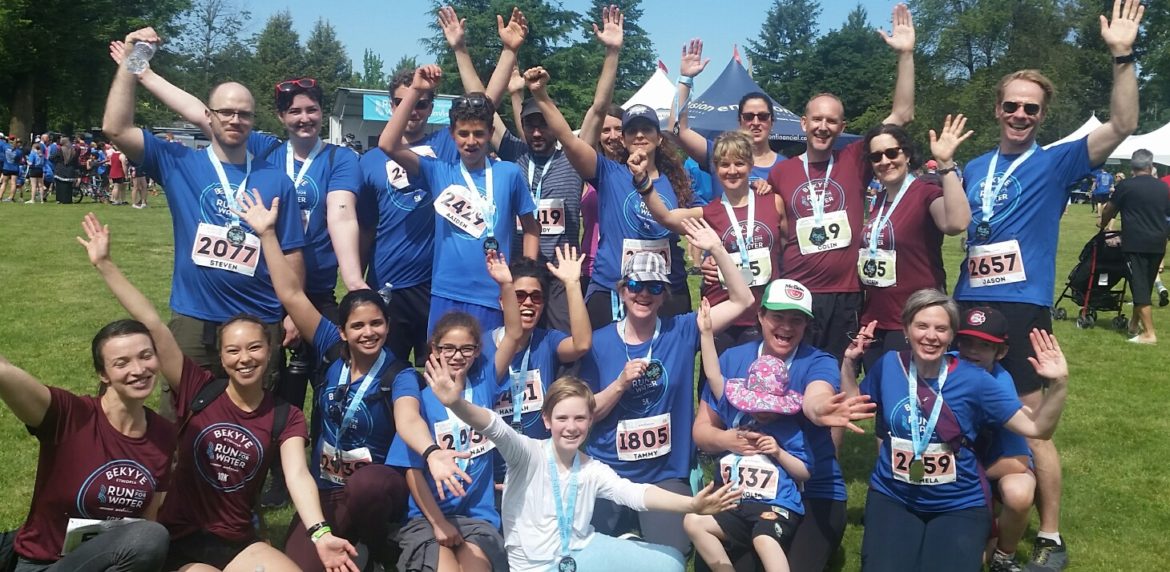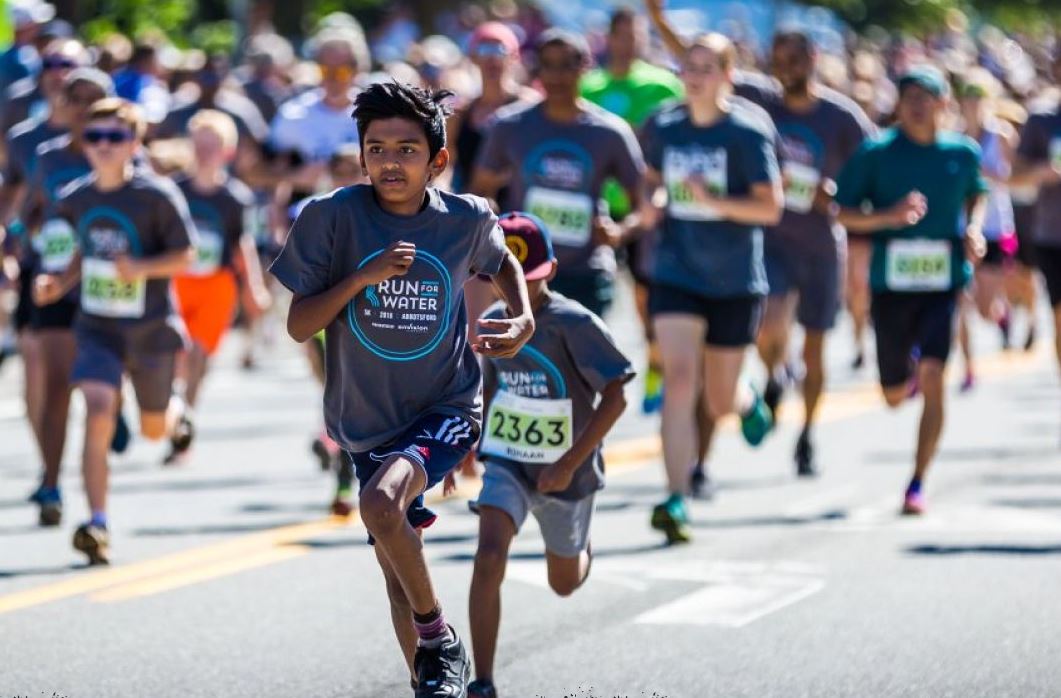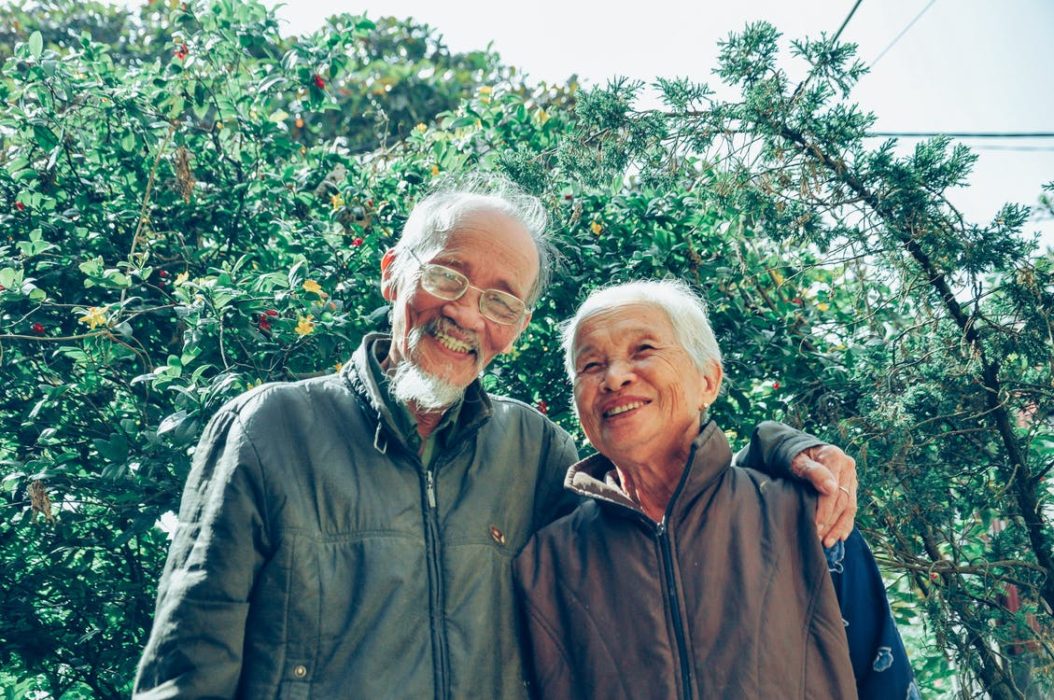Supporting Our Global Community: 2019 Run for Water
Last Sunday, OT Works! therapists and their families ran in support of Bekkye and other communities in Ethiopia. The 2019 Run for Water at Mill Lake Park (Abbotsford) raises funds for clean drinking water projects in these rural areas.
OT Works! Involvement
While our OTs work locally, we also want to have a global effect. As healthcare providers, OT Works! recognizes the impact one’s environment can have on well-being. By improving access to clean water, a community can transform. We are thrilled to have fund-raised and contributed over $2,226 to clean drinking water in Bekyye, Ethiopia.
About Bekyye
Bekyye currently has no access to clean water. Girls and women journey for hours every day to fetch water from rivers and ponds for cooking, cleaning, drinking and animal care. With the funds raised last weekend, as well as funds mobilized by the community of Bekyye itself (who are raising 10% of the project cost), access to safe, clean, and local drinking water can become a reality. The project aims to enable:
- Children to attend school
- Mothers to start businesses
- Fathers to water their crops
- Reduction in the transmission of waterborne diseases

Meet Kibra
Kibra is the youngest of 10 children and besides having to walk for two hours every day to fetch water for her family, she was travelling on foot for another two hours a day just to get to her elementary school. Five years ago, Run for Water began a sponsorship program in the communities where they bring clean water; this sponsorship provides a scholarship for girls to go to high school and university. Kibra was one of those recipients. Her story is an incredible example of what a small investment can do to change an entire community. Watch her story here:

Learn more and donate at Runforwater.ca.
Return-To-Work: The OT’s Role
Occupational therapists (OTs) support you during your transition back into the worker role after an injury or accident. OTs facilitate realistic and proactive return to work planning that considers all of the factors that impact success. Our OTs partner with you to develop plans that enable you to re-build your specific work skills, and the confidence needed for long-term success.
Location of Services:
Our OTs meet you at your home and workplace to develop a return-to-work plan and to facilitate your progress.
Examples of Services:
- Job Site Visit
- Job Demands Analysis
- Assistive Technology
- Ergonomic Assessments
- Assessing Function in relation to Work Demands
- Gradual Return-to-Work (GRTW) Planning
- Gradual Return-to-Work (GRTW) Monitoring
- Vocational Assessment
- Accommodations
How can OT help me return to work?
- Assess return to work readiness
- Provide education, strategies and coping tools
- Facilitate symptom management
- Prescribe and organize appropriate assistive and ergonomic equipment
- Develop personalized plans with attainable goals
- Advocate for return to work options with your employer
- Provide on- and off-site coaching
Who can refer me?
There are many professionals who can refer you to RTW Occupational Therapy. These include:
- Medical providers, such as your GP, physiotherapist, psychologist, etc.
- Public services, such as WorkSafe BC, ICBC, health authorities and hospitals.
- Other professionals involved in your recovery, such as your insurance specialists, adjuster or lawyer.
Who pays?
OT services are typically funded by WorkSafe BC, ICBC, your extended health insurance coverage, health authorities or legal settlements. You or your family can also pay for your treatment privately.
Why OT Works?
We have assisted clients as they returned to work and other meaningful activities since 2001. At OT Works!, treatment is client-centred. Every assessment and intervention is individualized so that your goals are in mind. While our knowledge is extensive, we have a particular focus on cognitive challenges (mental health and concussions) and ergonomics. Regardless of the nature of your challenges, we will partner with you to develop a plan built for your success. We help you return to work so that you can stay at work.
#GetLoud – CMHA Mental Health Week (May 6 – 12, 2019)
Mental health is a state of well-being, and we all have it.
Mental health is about more than being happy all the time. It’s about feeling good about who you are, having balance in your life, and managing life’s highs and lows. We might have a mental illness, and we might not. Either way, we can all feel well. We can all have good mental health.
This May 6th to 12th, you can #GetLoud about what mental health really is. Research shows that there are six common features of good mental health: a sense of self, a sense of purpose, of belonging, contribution, enjoyment and resilience. Here are some examples of what mental health looks like to Canadians:
- I don’t worry too much about what people think of me.
- I feel like I’m reaching my potential.
- I feel like I belong.
- I make the world a better place.
- I enjoy my life.
- Knock me down and I’ll get back up again.
Visit https://mentalhealthweek.ca/ for more information on CMHA’s 2019 Mental Health Week.
How can we help?
OT Works! helps clients with their mental health. We have significant experience working with individuals with mental health challenges
such as depression, anxiety after an accident or concussion. Here are some examples of services we can provide:
- Behavioural Activation
- Cognitive therapy
- Exposure Therapy
- Mindfulness Strategies
- Assistance Daily Living
- Graduated Return-to-Work support
Some of our OTs focus their practice around mental health Find out more at https://www.ot-works.com/about/the-team/ or call us at 604-696-1066.
Additional Resources
- Mental Health Checklist – https://mentalhealthweek.ca/check-in-on-your-mental-health/
- “How is mental health like physical health?” – https://mentalhealthweek.ca/how-is-mental-health-like-physical-health/
- “16 strategies to help you thrive” – https://mentalhealthweek.ca/16-strategies-to-help-you-thrive/

Supporting Global Communities: 2019 Run for Water
As community OTs, we journey alongside many Canadians in the Lower Mainland. Last May, we extended our commitment to better health with the global community by participating in the Run for Water in Abbotsford, BC. We are excited to share that we will put on our runners and grab our water bottles again this May 26th for the 2019 Run for Water!
Learn more and join the movement for clean water, visit
https://www.facebook.com/RunForWater/.
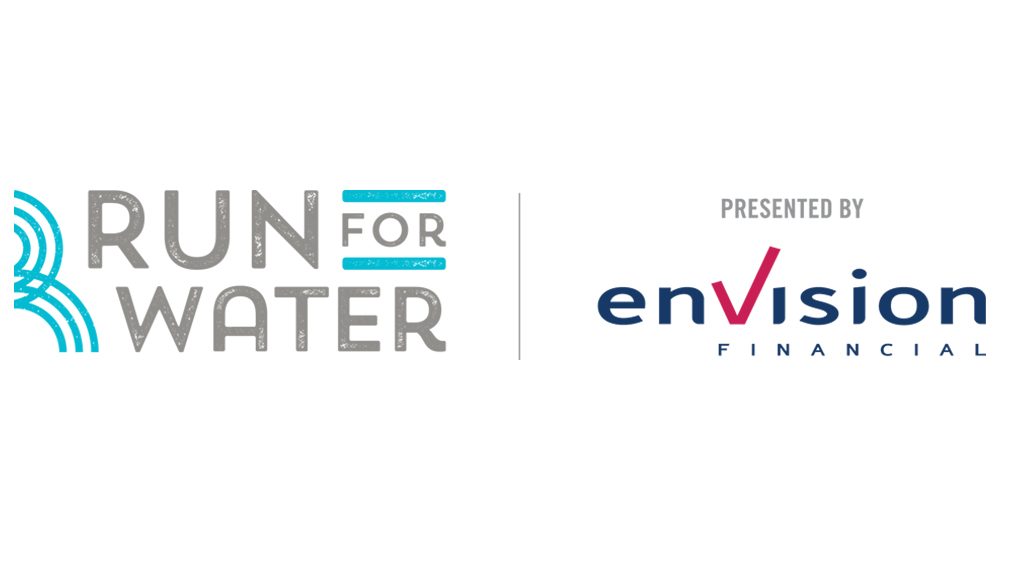
Health & Safety in the Office: Ergonomics
An effective workspace is essential to feeling well at work and wherever else. Ergonomic changes to your workspace promote good posture and contribute to physical wellbeing. They also allow better efficiency with tasks. Consider the ergonomic recommendations below and seek professional help from a registered occupational therapist if you need more help.
Ergonomic Recommendations
Consider the following:
- Posture.
- Are you sitting up straight?
- Are your shoulders relaxed?
- Are you leaning forward, creating tension in your back?
- The height of your chair.
- Are your forearms horizontal, your wrists straight, and your thighs at a 90 – 110 degree angle at the hips?
- Does the lower part of your backrest support the curve of your back?
- Do you have armrests, to decrease the strain on your back and neck?
- Your computer monitor.
- Is the top line of text on the screen at eye level?
- Is the screen an arm’s length away from your eyes?
- Do you need to adjust the contrast, brightness, or font size on the screen?
- Your visual needs.
- WorkSafe BC has a list of information to share with your ophthalmologist or optometrist regarding your desk and computer work.
- Do you need to lower the overhead light levels to prevent glare?
- Do you need to move your desk lamp (to the opposing side to your dominant hand)?
- Your work area organization.
- Are frequently used items close to you (within a 30 cm reach)?
- Are occasionally used items within an arm’s reach to you (within a within a 50 cm reach)?
- Are any rarely used items put away or set further aside?
- Your phone set up.
- Do you use a headset or speakerphone to avoid awkward neck positions?
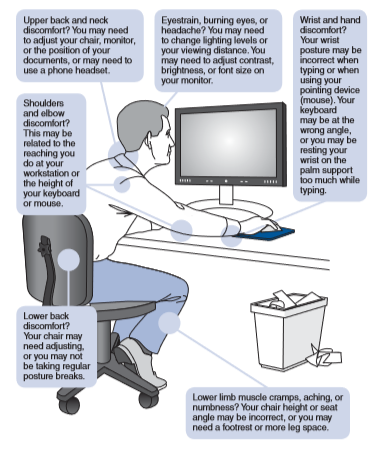
Take short breaks (20 sec. to 2 min.) to allow your muscles to rest between repetitive activities. On longer breaks, stand up and walk around so that you use different muscles than while sitting. Try basic exercises like these here or here to help you prevent strains at work.
You may find an ergonomic assessment by an OT to help address any issues you have. Contact us and we will be happy to have an occupational therapist come to you.
E-mail: info@ot-works.com
Phone: 604.696.1066 ext 1000
Resources
- “Ergonomics & Computer Use.” University Health Services at Princeton University. https://uhs.princeton.edu/health-resources/ergonomics-computer-use
- “Office Ergonomics.” HealthLink BC. https://www.healthlinkbc.ca/health-topics/tr5915
- “How to Make Your Computer Workstation Fit You.” WorkSafeBC. https://www.worksafebc.com/en/resources/health-safety/books-guides/how-to-make-your-computer-workstation-fit-you
Meet Jaclyn Forsythe & Nicole Chan
Welcome Jaclyn Forsythe and Nicole Chan to the OT Works! team. They provide community OT services helping clients with musculoskeletal and orthopaedic injuries as well as mental health issues and mixed diagnoses. They work with clients following motor vehicle accidents and workplace injuries with a focus function and return-to-work.
Nicole is passionate about community-based rehabilitation. She meets her clients where they are at in their recovery and her treatment solutions are insightful, creative and individualized.
Jaclyn organizes and simplifies complex situations to produce meaningful results. She has experience with chronic pain with a focus on return-to-function and return-to-work.
Like all of our therapists, Nicole and Jaclyn, are full registrants and in good standing with the College of Occupational Therapists of British Columbia (COTBC).
Learn More:
- Nicole Chan: https://www.ot-works.com/team/nicole-chan/
- Jaclyn Forsythe: https://www.ot-works.com/team/jaclyn-forsythe/
- The OT Works! team: https://www.ot-works.com/about/the-team/
SMART Resolutions
OT Works! takes the SMART approach to goal setting. We help our clients clearly define their goals and put steps in place so that they can achieve them. Using approaches similar to ours, you can successfully maintain your New Years’ resolution.
Occupational therapy is goal-oriented. Our clients may want to bear a certain weight with their arms. They may work towards returning to work full-time. Perhaps, they want to be able to go about their daily routines as independently as possible. We use SMART goal-planning to make that happen. It is a popular technique that works for many.
If your goal is unrelated to the examples above, that is okay. Try this method out and maybe you will achieve your goal too.
Setting Up Your Goal
Specific
- Your goal should be well defined and clear.
- Ask yourself:
- What am I trying to accomplish?
- Why am I pursuing this goal?
- Who is involved?
- Where is my goal, or where will I work towards obtaining it?
- Which resources do I need and which barriers do I face?
- When will I start? When will I meet my goal?
Measurable
- Know how far you are from completing your goal.
- Ask yourself:
- How much or how many do I need?
- How will you know once you have achieved your goal?
Achievable
- Your support network can help motivate you so that you aren’t overwhelmed.
- Ask yourself:
- Are those people who can help me (such as friends, family, health professionals, and/or employers) aware of my goal?
- What resources or support can they provide?
Realistic and Relevant
- Be honest with yourself.
- Ask yourself:
- Do I have the resources, knowledge and support to achieve my goal?
- Does my goal support my current or future needs?
Time-Based
- Check that you have the right amount of time
(not too much, not too little) to achieve your goal. - Ask yourself:
- When will I aim to accomplish my goal?
- What steps will I take along the way?
- What can I do today?
PGAP
Besides SMART goals, some therapists at OT Works! are trained in the Progressive Goal Attainment Program. To deliver PGAP services, occupational therapists require additional training and a certificate. PGAP is an evidence-based program that reduces the barriers of disability by specifically targeting the psychological and social obstacles clients face. PGAP aims to increase a client’s quality of life and to assist them with their return to work. If you would like to inquire further about PGAP, please contact referrals@ot-works.com.
Learn More
- SMART Goals – https://www.projectsmart.co.uk/smart-goals.php
- SMART Goals – https://www.drjulieconnor.com/smart-personal-goals/
- PGAP – https://www.pgapworks.com/en/index.php
- For more information about our OT Works! therapists can help you achieve your health-related goals, visit https://www.ot-works.com
2018 – OT Works! Year in Review
As 2018 draws to a close, we reflects on how we have grown as a team and as a part of our wider community this past year. This year we welcomed four new occupational therapists and a new communications coordinator to our team. We have become better acquainted with the strengths and passions of each OT Work! team member in our regular social events, professional development sessions, and expanding range of rehab services.
We have also supported other organizations as they empower people in Canada and around the world ( Run for Water, Because I am a Girl, Project Change Foundation).
In 2019 we look forward to creating new memories, walking alongside our current and future customers and clients, and continuing to learn and grow.
From our families to yours, we wish you a Happy Holidays, and a Joyous New Year!
Being Mindful During the Holidays
The holiday season is a time of joy and connection with others, but it can also be a stressful time of year. With shorter days and darker weather, the holidays can also bring lengthy to-do lists, and crowded activities and limited time to relax and share meaningful moments with family and friends. Practicing mindfulness can help alleviate the winter blues and better prepare you for the holiday season. Mindfulness can help you enjoy the seasonal changes and let go of holiday stress and channel your attention towards the current tasks at hand.
What is Mindfulness?
Mindfulness is the intentional practice of letting go of stress and pain and letting yourself experience what is happening right here and now. The intention is to mentally let go of things that distract you from what you are doing. Mindfulness is often about letting go of our to-do-list tasks, expectations and worries so that you can focus completely on what you are doing in the present moment.
Mindfulness is one strategies that an occupational therapist can help you make activities more approachable, especially those that have become stressful since an illness or injury.
Try It Out!
The more you remember to return your attention to the present moment in this exercise, the easier it will be to do so during a real-life moment, when your attachment to thinking or worrying creates unnecessary stress. Randy McVeigh, an occupational therapist with OT Works!, has 11 years of experience practicing mindfulness. Here is one of Randy’s approaches to mindfulness for the holidays: Sound meditation.
Sound Meditation
- Set a timer: Decide how long you will practice the mindfulness exercise for. Consider aiming for 5, 10, or 15 minutes.
- Get comfortable: Sit in an upright position on a chair or couch; try to find a position in which you can feel comfortable, yet alert
- Breathe: Close your eyes and take 5 deep breaths. Feeling your belly expand and contract as you inhale and exhale
- Listen: Notice the sounds in the environment around you. You may be able to hear the sound of cars outside, your refrigerator humming, neighbours talking, or any multitude of other things. Or, you may hear silence.
- Notice and observe: Try to just notice the quality of the sounds you are hearing, without getting caught up in thinking about what they mean. For instance, if you hear a dog bark, pay attention to the sound of the bark, without thinking about whose dog it is and what the dog is barking at. We are trying to practice keeping our attention “present” to the on-going sensation of sound, rather than getting lost in thinking about sound. This is easier said than done! Most people will get distracted many times when meditating for 5 minutes. That’s normal! Don’t try to stifle thought. Just acknowledge when you have been distracted by thought, and practice gently returning your attention to the sounds.
- Notice your feelings: You may find yourself enjoying listening to the sounds. If you are startled or irritated by a particular sound, just notice this feeling the sound has created in you, and return your attention to the sound
- Focus again on your breath: Return your attention to your breathing. Take 5 deep breaths, noticing the feeling of the air going in and out.
- Return: When your timer alerts you, or when you are ready, gently open your eyes. Take a moment and observe your environment (sounds, smells, sights). Notice how your body feels right. Notice your thoughts and emotions.
That’s the practice. It’s often been said that it’s very simple, but it’s not necessarily easy. This exercise isn’t about the mindfulness meditation itself, it’s about building a skill that you can take out into the world. You can develop both concentration and awareness so you’re able to more frequently recognize what’s happening right now, make more intentional decisions about where your attention should be, and respond to daily situations in a more skillful way.
Learn More
- Why should you practice mindfulness? Learn the benefits at https://greatergood.berkeley.edu/topic/mindfulness/definition#why-practice.
- How does mindfulness work? Learn about its mechanisms of action at http://www.mindfulnessinstitute.ca/the-science/
- Practice gratitude this holiday season! Visit https://www.mindful.org/a-simple-mindful-gratitude-exercise/ for mindful techniques to raise your mood and spread happiness.
- The BC Crisis Centre is a resource for residents of British Columbia. Check out their recommendations for mindful practice at https://crisiscentre.bc.ca/mindfulness/.
Supporting Communities: Project Change Foundation 2018 Awards
The Project Change Foundation held its annual award and fundraising event on November 22, 2018. Project Change provides small grants and other support to new or emerging charities with a clear vision for improving their communities or the environment. This year’s PCF grant recipient is Chilliwack Restorative Justice and Youth Advocacy Association. Previous recipients: The Lipstick Project, Community First Foundation, and Binners’ Project.
OT Works! is a proud sponsor of the local Vancouver non-profit organization Project Change Foundation. Change is central to the philosophy of occupational therapy and our therapists facilitate change to promote health and recovery. Pamela and Jason attended the Project Change event and panel discussion on “Living Your Best Life: Ideas For Unleashing Your Full Potential”. We were inspired by the ideas and wisdom shared by the panel.
Learn more about the Project Change Foundation and the Chilliwack Restorative Justice and Youth Advocacy Association.
You can learn more about approaches to restorative justice here.

